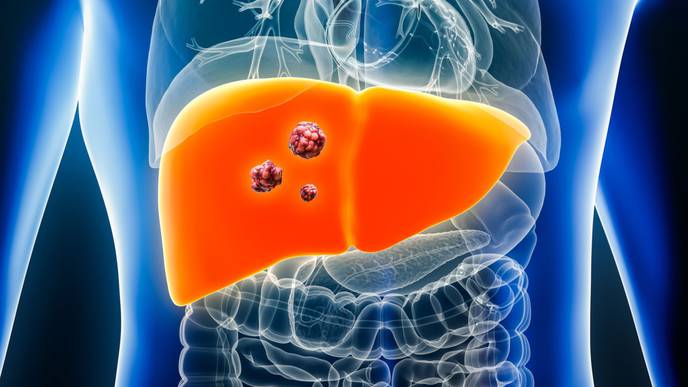ReachMD
Be part of the knowledge.™Researchers Look to Improve Early Identification of Liver Cancer

Researchers Look to Improve Early Identification of Liver Cancer
An overwhelming majority of hepatocellular carcinoma occurs in people already suffering from cirrhosis of the liver.
But even with screening guidelines in place for individuals with cirrhosis, many cases of hepatocellular carcinoma — the most common form of primary liver cancer — are missed until they’ve grown advanced and difficult to treat.
Hassan
A new review from The University of Toledo suggests focusing on a different biomarker than what’s currently in clinical use could help expedite diagnoses and, potentially, lead to better treatment outcomes.
“Hepatocellular carcinoma, or HCC, usually grows slowly in its early stages. Therefore, it can often be cured/treated if detected in early stages,” said Dr. Mona Hassan, a UToledo gastroenterologist and transplant hepatologist. “As the lesion grows, tumor volume can double in four to five months. The more advanced HCC and the larger the tumor is, the more the risk of it metastasizing and the more we’re limited in our treatment options. Ideally, we want to catch those patients very early with small lesions that we can treat.”
Hassan, an assistant professor in the UToledo College of Medicine and Life Sciences, recently led a systematic review of 53 peer-reviewed studies from across the globe that evaluated blood-based biomarkers, known as AFP and PIVKA-II.
AFP is the most commonly used HCC tumor marker in the United States, often being paired with abdominal ultrasound in patients with known risk factors for developing liver cancer, such as cirrhosis or chronic hepatitis B infection.
PIVKA-II has been studied with interest but is more costly and has not been widely adopted as a clinical tool.
Though prior studies comparing the two biomarkers have brought inconsistent findings, the UToledo analysis, which included thousands of patients with hepatocellular carcinoma, delivered clear evidence that PIVKA-II is better able to identify individuals with cancer while returning no more false positives than AFP.
The findings were published last month in the Journal of Clinical Medical Research.
Liver cancer rates are on the rise globally, with 841,000 new cases diagnosed each year, making it the sixth most prevalent cancer worldwide.
Though liver cancer does not rank among the top 10 most common cancers in the United States, data from the National Cancer Institute show it is the sixth most deadly, responsible for claiming an estimated 29,380 lives this year alone.
Part of what makes HCC so deadly, Hassan said, is that patients don’t often experience any specific symptoms until the disease has advanced significantly.
“It is important given the poor prognosis and the rising incidence rates that we’re able to identify liver cancer early,” she said. “The earlier we detect it, the more we can do with that patient and help them. Our analysis demonstrated that PIVKA-II outperforms AFP in diagnosing HCC.”
Notably, the analysis concluded PIVKA-II was more accurate than AFP in identifying hepatocellular carcinoma regardless of the cause and across racial groups, strengthening the case that it might be worth adding to screening panels or even one day replacing AFP.
Though more work needs to be done, Hassan said the UToledo study provides some of the most compelling data to date that there may be a better way to screen high-risk patients for the deadly disease.
“If that were to become the standard marker and we were in fact detecting HCC earlier, that would have a significant survival benefit to individuals that are getting screened for HCC,” she said. “We need more data to strengthen the drive to switch from AFP to this marker and there are a lot of factors to look into, but this is very promising.”
Recommended
A Look at the Treatment Landscape for Gastroparesis
GI InsightsA Look at the Treatment Landscape for Gastroparesis



Facebook Comments